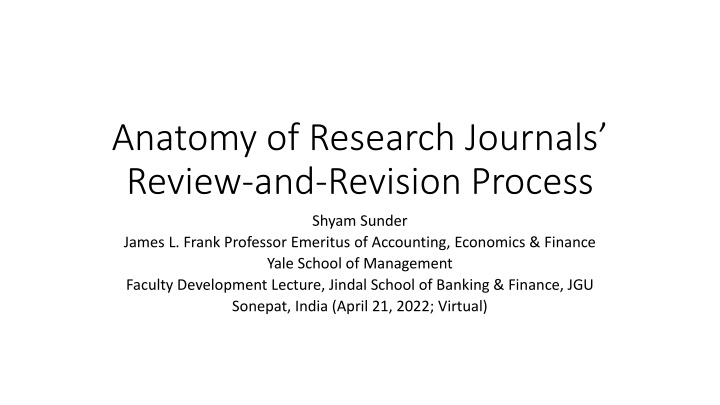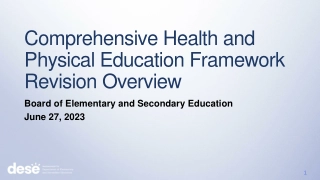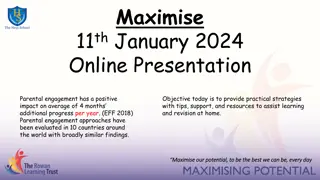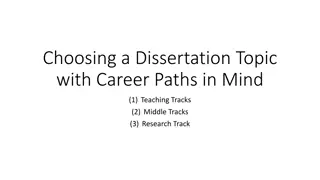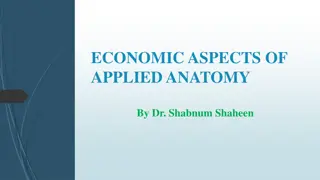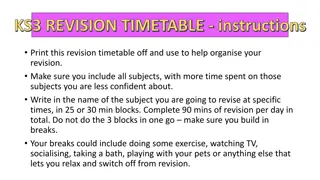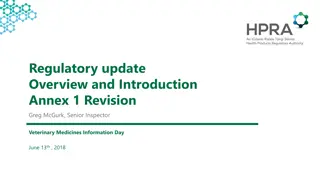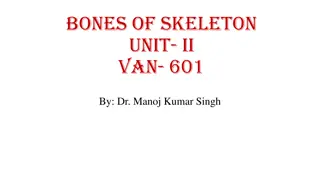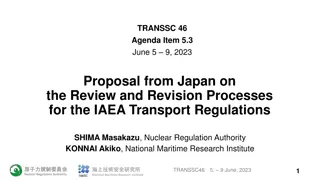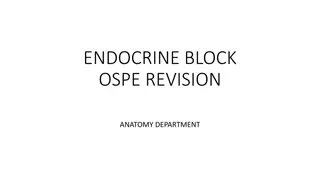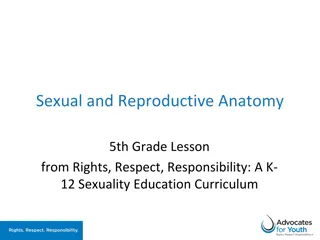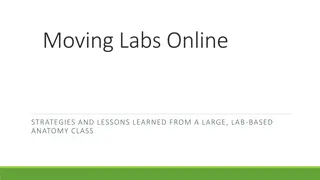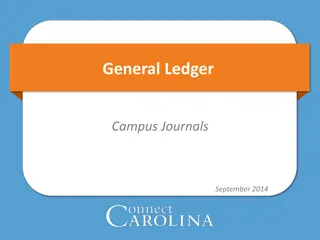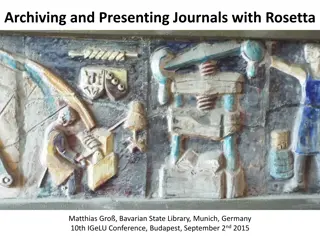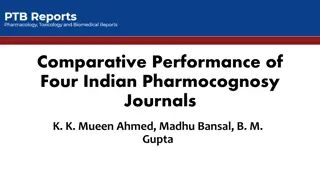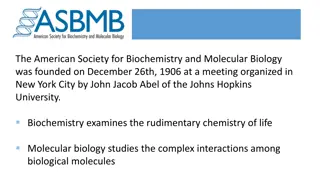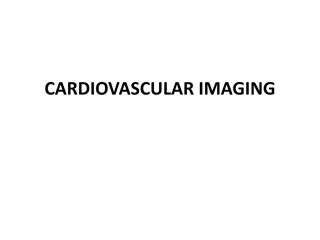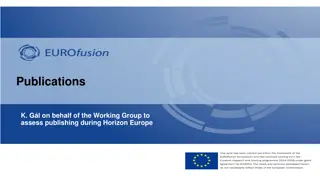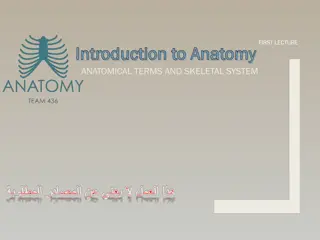Anatomy of Research Journals Review and Revision Process
This content delves into the significance of research journals, their role in advancing knowledge, pre-requisites for effective functioning, challenges encountered, and key participants in the research process. It also explores the critical functions of journal reviews, emphasizing key questions such as relevance, validity, replicability, generalizability, and effective communication.
Download Presentation

Please find below an Image/Link to download the presentation.
The content on the website is provided AS IS for your information and personal use only. It may not be sold, licensed, or shared on other websites without obtaining consent from the author.If you encounter any issues during the download, it is possible that the publisher has removed the file from their server.
You are allowed to download the files provided on this website for personal or commercial use, subject to the condition that they are used lawfully. All files are the property of their respective owners.
The content on the website is provided AS IS for your information and personal use only. It may not be sold, licensed, or shared on other websites without obtaining consent from the author.
E N D
Presentation Transcript
Anatomy of Research Journals Review-and-Revision Process Shyam Sunder James L. Frank Professor Emeritus of Accounting, Economics & Finance Yale School of Management Faculty Development Lecture, Jindal School of Banking & Finance, JGU Sonepat, India (April 21, 2022; Virtual)
Why Research Journals? To Help make a better world To discover, learn and disseminate new knowledge To filter ideas, promote informed debate and discussion To evaluate researchers To reward and promote faculty To make it difficult to publish To help refine research methods and presentation To keep the control of old guard as gatekeepers To reduce teaching loads
Pre-requisites for Research Journals to Serve Their Function in Society An active research community with shared goals of advancing knowledge and practice Integrity of researchers, editors and reviewers Broad agreement on valid methods of research Willingness to fail and survive in research endeavors Balance between basic and applications research Subservience of theories to data
Challenges to Functioning of Journals Experts time is scarce (difficulty of getting knowledgeable people to spend their time reviewing others work) Experts limited knowledge Experts self-interest: they may not always pursue truth as angels Use of publications in researcher evaluation Inherent noise in research findings and review process Extreme difficulty of establishing causality in social sciences Commercial interest of publishers (cost of good review process vs. open access journals)
Participants in Research Process: Pressure Points Researchers Editors Reviewers Readers Disseminators
Functions of Journal Reviews 1. What is the question being addressed? 1. New; interesting (to who?) 2. Important 3. Is the author equipped to address the question? 2. What is the answer given by the author to the question posed? 1. Is the answer valid? 2. Is the answer replicable? (Independence of results from researcher) 3. How generalizable is the answer across time and space? 3. Are the question, answer, and the rationale communicated clearly and convincingly? 1. Logical organization 2. Facts, Data, Method and analysis 3. Are credible alternative answers discussed and ruled out? What Aboutery 4. Presentation style
Editors Comments and Suggestions (Keyed to 6) Interestingly, the financially non-fragile have less optimism about their personal condition (not significantly). Why? ((2.1) As expected, the fragile group has lower income, education, etc. ((2.1) Not sure what you mean the effect is statistically and economically significant. I would not discuss the economic impact of your results in the result section. Leave it to the discussion to indicate that the differences could have a significant economic impact. (3.1) I was surprised that income and employment had no relationship to optimism. Can you explain this result? (3.3) IN figure 1, it seems that financial optimism is higher for financial fragile individuals (among the HL). This is surprising. (2.2) The discussion section needs further elaboration and putting the work in context. You should discuss your findings in light of previous work and explain some of the points I have raised above. (3.3) Please include a proper abstract. (3.1) Please note that while COVID-19 has negative impact on many, it is mainly the low middle call and below. Many rich individuals have benefitted. There have been several news articles addressing this gap between the well of and the less well to do. For example, house prices in the UK have rising at the fastest rate in years, despite the slump in economic activity. (2.3) And you should acknowledge that there is a vaccine now.(3.2) Please do not put the references as footnotes but rather include them in the reference list. (3.4) Try to reduce the number of direct quotes. There are too many in the paper. (3.4) I think the financial literacy is important, but with regard to COVID-19 is might be more related to financial wealth than literacy. (2.2) You might like to include more information about financial literacy and better financial outcomes (such as saving, paying debt, etc.). A paragraph discussing the work would be enough. (2.2)
Reviewer 1s Comments and Suggestions Para 1: Overall evaluation, and encouragement for revision. Para 2: Pervasive problem of establishing causality in social phenomena, and common-cause problem Para 3: fuller explication of method Para 4: Asks for additional information about the scale on which certain variables are measured. Also questions the choice of explanatory variable by referring to an alternative (literacy) in the paper. Para 5: Questions the validity of the instrumental variable used in the paper to address the endogeneity problem; suggests simply acknowledging the endogeneity problem in absence of a defensible instrumental variable
Reviewer 2s Comments and Suggestions Makes concrete suggestions to revise and resubmit Omitted variables Endogeneity problem not adequately addressed Questions validity of the optimism variable Asks for the rationale for $50K threshold for low income classification Suggests a robustness test Suggests improvements in presentation of data Suggestions for clearer writing
Take Aways What is my primary motivation to do this work? Knowledge or rewards? Which of the great advances in research (in my own or any other field) were driven by pursuit of rewards? In evaluating my colleagues, am I counting their journal publications mechanically, or assessing the careful thought and analysis he/she engages in when teaching and conducting research? Writing and communication skills are worth spending our effort on After receiving a critical report on a paper, resist the temptation to respond immediately; wait a week, and read it again a few times, and share it with a couple of colleagues whose good judgment you trust Original contributions to human knowledge are not easy; it is thrilling!
Building Research Culture Sunder, Shyam. Building Research Culture China Journal of Accounting Research Vol. 1 Issue 1. (June 2008) Text (PDF). Chinese Translation (PDF) https://www.cb.cityu.edu.hk/research/cjar/ doc/200806/01_05- Building%20Research.pdf
